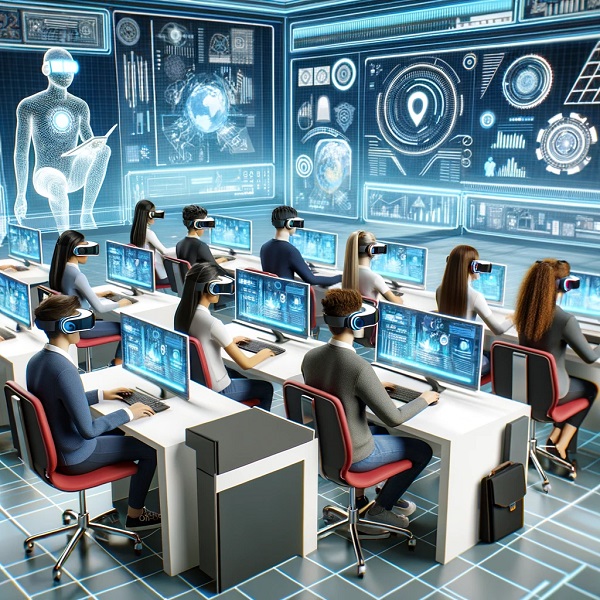In recent years, virtual reality (VR) has transcended the realms of entertainment and gaming, making a compelling entry into the field of education. With immersive environments and interactive experiences, VR is not just a tool, but a gateway to a new era of learning. As online education expands, blending digital classrooms with VR technology offers an intriguing prospect. Could the future of higher education lie in virtual reality? This exploration delves into the possibilities and challenges of pursuing full online degrees entirely within virtual realms. From the current landscape of VR in educational settings to what the future might hold, we examine how close we are to turning this fascinating concept into a practical reality. This article explores whether it’s feasible to pursue full degrees in VR, examining the current state of technology, educational applications, and what the future might hold.
Current Use of VR in Education
Virtual reality is already making significant strides in the educational sector, offering students immersive experiences that traditional learning environments simply cannot replicate. Universities and educational technology firms are collaborating to develop VR experiences that enable students to delve into everything from historical events to intricate biological processes in three-dimensional spaces. For instance, medical students can now perform virtual surgeries, providing a hands-on learning experience without the inherent risks of real-life procedures.
Potential for Full Degrees in VR
The prospect of earning a full degree entirely within a VR environment is both exciting and challenging. VR can simulate real-world scenarios and create interactive learning spaces that engage students on multiple levels. However, challenges remain, such as the high cost of VR equipment, the need for robust internet connectivity, and the development of comprehensive VR-compatible curriculums. These challenges, while daunting, present an opportunity for educators and technology enthusiasts to innovate and find solutions that can make VR-based education more accessible.
Case Studies
Several institutions are pioneering the use of VR in higher education. For example, the Virtual Reality Initiative at MIT has created numerous VR courses designed to enhance students’ understanding of spatial and abstract concepts across sciences and humanities. Similarly, Stanford University’s Virtual Human Interaction Lab is exploring how VR can be used to foster empathy and cultural awareness among students.

Expert Opinions
Educational technology experts are optimistic about the role of VR in future education systems. They predict that as technology advances and becomes more affordable, more institutions will adopt VR to deliver specific courses and entire degree programs. Feedback from early adopters in academia suggests that VR can significantly enhance student engagement and retention, although there is a steep learning curve in content creation and technology management.
Comparative Analysis
When comparing VR-based education to traditional online learning, several distinctions become apparent. VR is inherently more engaging, providing an immersive experience that can lead to better retention of information and higher student satisfaction. However, traditional online learning platforms are currently more accessible to a broader audience due to lower technological requirements and costs.
Future Prospects
The integration of VR into higher education is not a question of ‘if ‘, but ‘when ‘. As technology evolves and becomes more integrated into our daily lives, the use of VR in education is set to become more prevalent. The next decade could see significant advancements in VR platforms, making them lighter, more powerful, and less expensive. As these improvements materialise, full online degrees through VR could become a standard offering at universities worldwide. This reassurance about the future of VR in education should instil a sense of confidence in the potential of this technology.
The potential of VR in education extends beyond just supplementing current teaching methods; it can transform how and where we learn. As educational institutions and technology developers continue to explore VR’s possibilities, it will be fascinating to see how this technology shapes the future of education.
Are you ready to be part of this educational revolution? Whether you are a student, educator, or technology enthusiast, there are numerous ways to engage with VR in education. Consider participating in a VR demonstration, enrolling in a VR-based course, or simply starting a conversation at your institution about the future of VR in education. The future is virtual, and it’s time to take an active role in shaping it.
